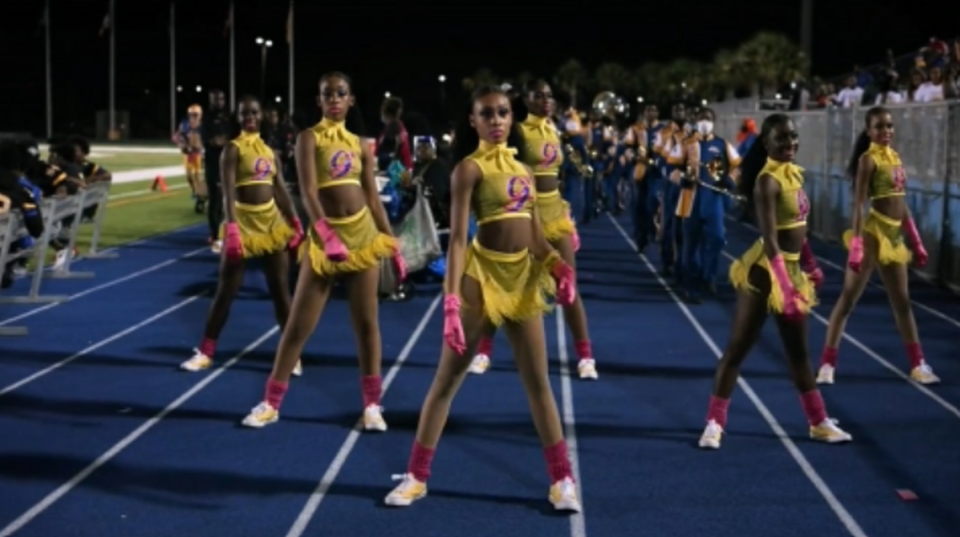The 44 Percent: Rap beef, Miami Northwestern dance team, RIP Rico Wade
- Oops!Something went wrong.Please try again later.
- Oops!Something went wrong.Please try again later.
- Oops!Something went wrong.Please try again later.
It’s been a hectic month for hip-hop.
In the last month, rapper Future and music producer Metro Boomin released two albums, appropriately named “We Don’t Trust You” and “We Still Don’t Trust You.” A song on the first album, “Like That,” features a scathing verse from Kendrick Lamar that dissed Drake and J. Cole.
Kendrick, Drake and Cole are considered hip-hop’s Big 3 and Kendrick Lamar emphatically denied that by asserting himself as the best MC in the game.
J. Cole responded to Kendrick with a dis of his own before apologizing--something totally unacceptable within the genre.
By the time A$AP Rocky dissed Drake and Rick Ross released his own Drake dis for good measure, it made me wonder: What’s the end goal here?
I grew up seeing the fatal results of the Biggie and Tupac beef and years later, the Jay-Z and Nas beef that stayed on wax and led to Nas’ “Ether,” a song that I still consider the best dis ever. Even the Drake and Meek Mill beef of the 2010s was significant enough to derail Meek Mill’s career for years to follow. Here, it looks like there are no stakes. Or perhaps even more concerning, no one involved can agree on what they’re beefing about.
In 2024, the elite talent involved could be using their energy for something more significant. Pick any issue: lack of Black ownership of record labels, Black history being erased from schools, lack of affordable housing, the list could go on. Instead of taking shots at each other, these are the things artists with platforms could be addressing.
I love competition within hip-hop but I love seeing Black people overall make societal progress even more. - Michael Butler
INSIDE THE 305

Docuseries highlights Miami Northwestern high school’s dance team and their star coach:
Miami Northwestern Senior High School’s dancing team is the subject of a docuseries. Miami Herald reporter C. Isaiah Smalls II wrote about the group’s community impact and success.
There’s something very special about the Miami Northwestern Senior High School’s Golden Girlz.
Is it the outfits? Maybe. Is it the routines? Sure, that’s important. Is it the famous Supa Strut? That definitely plays a role.
The true source of the Golden Girlz’s (G Girlz) greatness, lies in their coach of the last 16 years: Traci Young-Byron. A Miami native and Northwestern alum, Young-Byron revolutionized her alma mater’s dance squad when she took over in 2008. Now, Young-Byron and her dance squad are once again in the national spotlight thanks to the recently released six-part docuseries “Supa Girlz,” the final episode of which debuted Thursday via streaming service ALLBLK.
“I wanted to be a part of something that would be meaningful, something that wasn’t scripted, something that would be impactful that talked about the community and highlighted the girls and myself in a way that we would be proud of,” Young-Byron told the Miami Herald.
OUTSIDE THE 305
Organized Noize producer Rico Wade gave Atlanta its voice and amplified it with a capital A
Rico Wade, the co-founder of Southern production team Organized Noize, passed away this past Saturday at the age of 52. With Organized Noize, Wade helped produce countless hits for OutKast and was a huge influence on hip-hop artists across generations. This Andscape story by Maurice Garland discusses his impact.
As a Georgia native, I have a deep admiration for OutKast and never stopped listening to to them throughout my life. Through soulfulness and eclectic musicality, Wade helped create work that will live on forever.
A handful of local architects designed the image that many people have of the city of Atlanta. Aesthetically, much of the city’s skyline is credited to real estate businessman John C. Portman. Politically and economically, it was built by efforts from leaders like Maynard Jackson, Atlanta’s first Black mayor. Culturally, it was shaped by visionary music producer Rico Wade, who died on April 13 at age 52.
As one-third of the pioneering production trio Organized Noize with Patrick “Sleepy” Brown and Ray Murray, Wade orchestrated the groundwork for Atlanta’s ongoing three decades-long run of relevance in hip-hop and Black music. With Murray and Brown serving as the musical heart and soul of the team, Wade was the voice of the operation, acting as the de facto glue, nucleus and leader for Organized Noize. While their predecessors, including Bobby Brown, L.A. Reid, Dallas Austin and Jermaine Dupri, showed that Atlanta was fertile ground for polished hit-making, Wade and Organized Noize were instrumental in revealing what living in the city was actually like in the post-Civil Rights era, giving natives a sense of pride and transplants a reason to come.
HIGH CULTURE

Can rap beef exist when no one agrees on what’s being fought for?
In this insightful NPR story, Sheldon Pearce discussed how one of hip-hop’s biggest events in years has become a complex beef between generational talents Kendrick Lamar, Drake and J. Cole.
In 2016, then-President Barack Obama weighed in on an issue of utmost national importance: Who would win in a rap battle between Kendrick Lamar and Drake? “Gotta go with Kendrick,” he said. “I think Drake is an outstanding entertainer, but Kendrick, his lyrics ...”
It was pretty clear what distance he was covering between “entertainer” and “lyricist”; it’s one that has been subject to debate since hip-hop’s earliest days. But just as fascinating, to me, is the idea of asking the commander-in-chief such a question in the first place: not simply pitting the two divergent stars against each other in the critical imagination, but supposing that any such showdown could be conclusive — that it could say something substantial about the artists’ standing — when even the framing of Obama’s answer seems to be partitioning them.
Where does “The 44 Percent” name come from? Click here to find out how Miami history influenced the newsletter’s title.

